The Russian authorities have adopted a new law, requiring citizens to place the mark "foreign agent" on any posts on social media or other media, if their source is media or human rights organizations or persons classified in Russia as foreign agents.
This law sparked widespread criticism and controversy in the country, between those who consider it a violation of freedom of expression and the right to deal with information, and those who fear that they will be subjected to legal prosecution for cooperating with foreign agents.
Natalia Prilodskaya, researcher on Russian affairs at Amnesty International said that these laws violate human freedom and international Russian obligations, are linked to the authorities' concerns, and come within the framework of restrictions on civil society.
But the issue is bigger than that for the Russian authorities;
Moscow, in this way, is trying to protect itself from what it considers interference in its internal affairs and a media campaign led by the West against it, according to Russian officials.
In this context, Evgeny Fyodorov, a State Duma deputy for the ruling United Russia party, says, “When it comes to national security, freedom of expression comes second.
"Destruction of the state must be allowed for the sake of freedom of speech," he added.
Activists say that the law tightens the screws on many institutions and organizations classified in Russia as foreign agents, pushing partners to abandon working with them, and raising reservations among the activists working in them and those who cooperate with them among the general public.
In this context, Diana Parsigyan, an expert at the "No to Violence" center included in the list of foreign agents, says that the law will of course affect them. .
Concerns are increasing about the dimensions and restrictions carried by the law, which may bring legal prosecution for anyone who publishes material originating from a foreign agent, and the authorities find it a threat to Russia's security.

